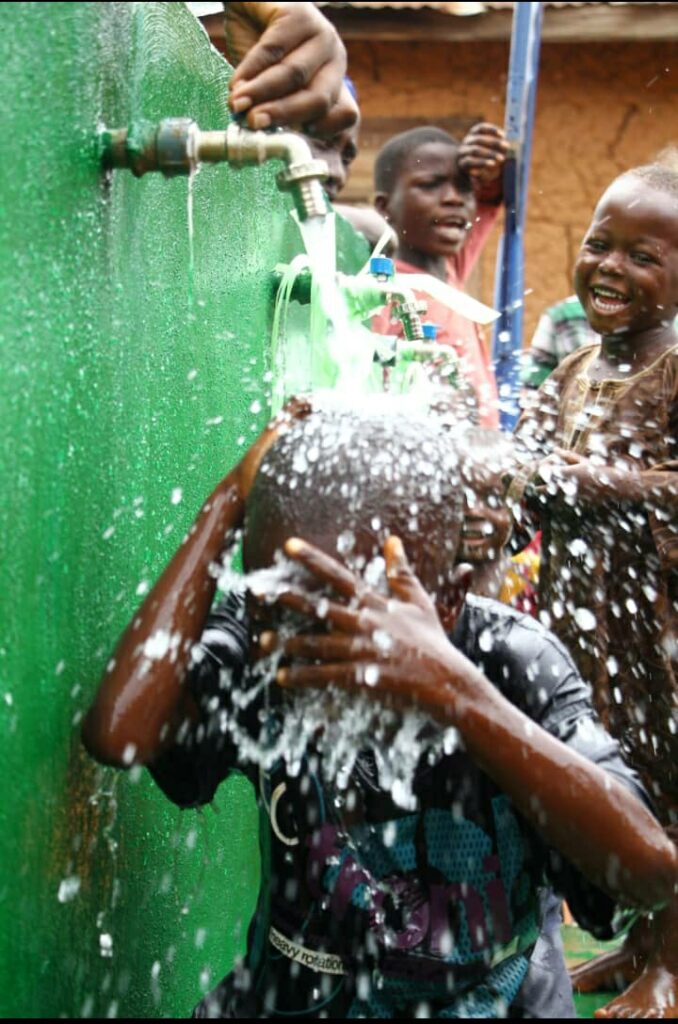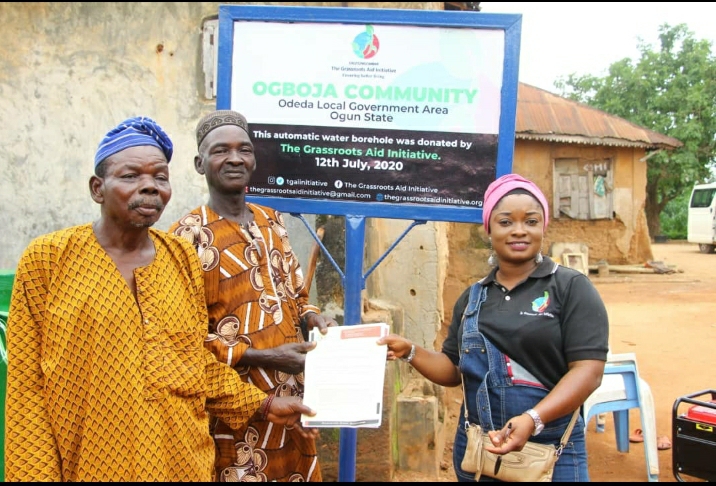Dr. Kehinde Kadri, Senior lecturer at the University of Ilorin and founder of The Grass root Initiatives,(TGAI), an NGO that provides water to communities facing such challenges. In this interview with our Editor, AAT, she talks about her life, career, and passion. (Excerpt)
Sparklight News: Nigerian lecturers are poorly paid, yet, you have decided to be giving back to the society helping the communities. How did you come about the idea?
Dr Kadri: I have been working in University of Ilorin for over 14years now and I decided to challenge myself by creating a path for myself that would be different from what I was used to. I wanted to prove to myself to people that I am not a failure and that I can achieve any task once a set my mind on it. Onward, I decided to be taking compelling pictures of people in rural areas in Kwara State. The picture speaks more of compelling narratives of the struggles, challenges and activities of rural people which are often ignored or taken for granted. I posted all these pictures on my personal social media handles and suddenly people started engaging and reacting to the pictures concerns. They started asking me so many questions about those pictures and this improved my low self-esteem. The pictures compelled my followers to contribute positively to the challenges of these people starting from donating money and materials to support the cause. The rest today is history.

I make bold to say today that with compelling pictures and emotive storytelling skills, i have been able to contribute meaningfully to the lives of over 10000 people in over 20 communities in 5 states in Nigeria through our water project.
Sparklight News: How do you combine research with philanthropy?
Dr Kadri: As an academician, I usually map out a plan for myself in every academic session. I do have more courses in first semester than second semester so I usually place minor projects such as seminars; relief materials donations between November and March which is usually in the first semester. Then I focus on capital projects such as water boreholes between April and August usually in second Semesters.

Also, I do use the period of first semester to focus on how to map out my plans and strategies for next projects.
Sparklight News: What led to the establishment of The Grass root Initiatives?
Dr Kadri: The passion for photography led me to establish a Non-Governmental Organisation. I started off by documenting the lives of people in rural areas by posting them of my Instagram account(IG). I was uploading pictures and writing short stories on my posts on every of my social media handles which led to a lot questions and suggestion that has led to helping people in the deplorable situation. I remember vividly one day, I had posted the picture of a girl carrying her bag on her head after she was sent out of school. I wrote a short story on it; then suddenly someone sent me a DM that she wants to pay for her school fees. There and then, I realised how powerful social media could be. This singular act changed my route in photography from documentary into humanitarian photography.
Sparklight News: An NGO focused on water. Will that be the only focus of your grassroots movement?
Dr Kadri: The Grassroots Aid Initiative (TGAI) is striving to be one of the foremost NGOs in Nigeria that strives to improve the lives of people at the grassroots level especially when it comes to SDG 4 and 6. TGAI wants to be known more as a water solution NGO because we have been able to discover our strength in SDG4 than other SDG Goals.

Therefore, our area of core competence is water but we have also involved other aspects on humanitarian activities such donating relief materials to different villages, donation of shoes to pupils in primary schools in foutr states in Nigeria, building house for an old woman who was living in a dilapidated muddy home, payment of school fees of pupils and students etc.
We focused more on water projects in 2020 because of the COVID 19 pandemic that was ravaging the world and the need to use water to improve the deplorable water situation in underserved rural communities.
Sparklight News: How do you raise funds to support communities?
Dr Kadri: TGAI raises funds from the public through social media crowd funding and personal donations from families and friends.
Sparklight News: Since when did you start TGAI and what are your other plans?
Dr Kadri: TGAI was founded in March 1, 2017. We hope to move into others states in Nigeria such as the Northern and Eastern part of the country in order to give the NGO a national outlook.
Sparklight News: Tell us about your love for photography?
Dr Kadri: I had fallen in love with photography at a tender age; those innocent periods when we were asked to say ‘cheese’ while the camera would click away. Then, my natural assumption was that everyone was in love with taking pictures. I couldn’t imagine how anyone on earth would see taking pictures as an enemy. Even at that tender age, I knew pictures brought so much happiness and it was a special way of preserving beautiful memories. I always looked forward to catching a glimpse of the pictures taken when the professional photographer clicks away on the analogue camera. As I grew older, I used to fantasize about owning a camera. The opportunity eventually came during my undergraduate days. I can hear you say it took so long. The passion for photography as such regained a new force and the fire has kept burning in my soul since then.
In the recent past, I had different shattered perspectives of photography; I saw it as a mere art that everyone practices just to keep record of the past and present. My doctoral degree sojourn to Malaysia redefined my appetite for the creative hobby. The beautiful green sceneries in and around Malaysia were awesome. The environment kept firing the passion that was domiciled in me. There and then, I made a resolution that I must strive to make a remarkable impact when I resume duty at my place of work back home in Nigeria.
Sparklight News: What has been the response of those communities you had supported?
Dr Kadri: In the beginning when we first started the NGO, most of the communities that we went to do feasibility studies do not believe us when we tell them that we wanted to take pictures to tell stories to raise funds for them. Some of these people in the community were at first hostile that some of them stoned us when we refused to give up in our persuasion. We had to cajole and convince profusely before they reluctantly agreed. After the huge success of the water project in Asileke, it was other villages that started calling us for help. Now we only go to check the villages to make sure they actually have water need. Once we go to a village and we realised that the existing water projects in that community wasn’t maintained, we don’t embark on any project in such community.
Even after the execution of our projects, we still maintain cordial relationships with the community people. We still stay in touch with them.
Sparklight News: Which community outreach are you considering next?
Dr Kadri: We have clothes and shoes donations to make for the next few months before we embark on another major project before the end of the year. We have not considered which community we would activate those projects yet but between now and December we would execute three projects.
Sparklight News: Are you expecting government or international bodies support or partnership in any form?
Dr Kadri: I have not gotten any international collaborations but TGAI receives funds from individuals from outside the country through Gofundme which we usually use to raise funds. We have not gotten any government support yet but we are hoping to get one in the nearest future because we want to work with government. We have been applying to different donor agencies but we have not gotten a positive response yet.
Sparklight News: Away from Water NGO, What made you go into lecturing?
Dr Kadri: I found myself in teaching; it wasn’t what I planned for. When I finished from University of Lagos in 2005, I wanted to work in advertising agencies but God created a path for me in academia when I was retained after finishing my NYSC in 2007.
Sparklight News: How do you create time for your family?
Dr Kadri: I spend time with my family most times after work and during weekend. We visit different beautiful amusing places that we can afford. We share beautiful memories. Family is the most important thing in the world. In fact, family is everything
Sparklight News: Can you remember any unforgettable experience while growing up?
Dr Kadri: I was victimized by a male lecturer while in 200 level at University of Lagos. The lecturer made sure I was rusticated for one full session because I refused to tango with him. That period served as a turning point in my life. It repositioned my life and made me more resilient than I thought I could ever be. The saying that what doesn’t kill you makes you stronger sums up in this scenario.
Sparklight News: Back in the University, how can you describe yourself?
Dr Kadri: I was a calm, shy, unassuming girl back then. I didn’t want to be noticed at all.
Sparklight News: How do you unwind?
Dr Kadri: I spend time with my loved ones, travel; speak on various related topics on different platforms both in and out of Nigeria.
Sparklight News: Do you have any greatest regret?
Dr Kadri: The greatest regret I had was seeking affirmations from people at the detriment of my self-conviction. I had an extremely low self-esteem while I was growing up
Sparklight News: Do you intend going into politics later in life?
Dr Kadri: Not at all. I am not sure I can survive in Nigeria politics. I can accept government appointment but not politics.
Sparklight News: Do you have any idea in pipeline?
Dr Kadri: Ideas keep sprouting up every time. For now I want to make the water NGO more encompassing and engaging with the audience. We want to merge SDG 4 and SDG 6 projects into a single project. Book and photography exhibitions are also some of the ideas on the pipeline.
Sparklight News: General Advice
Dr Kadri: Once you believe in yourself, every task is attainable.